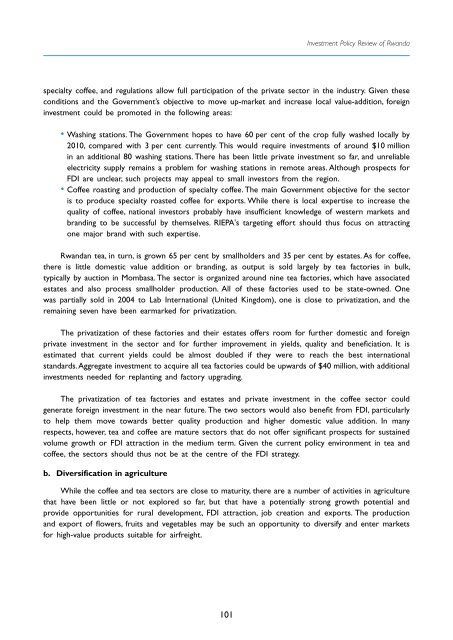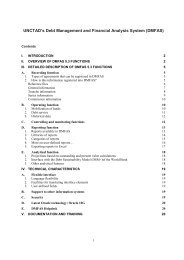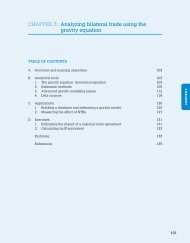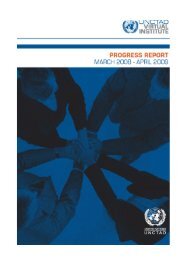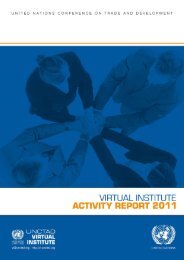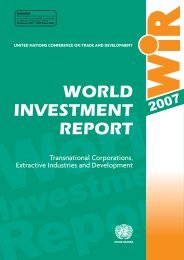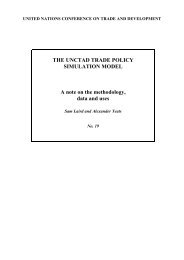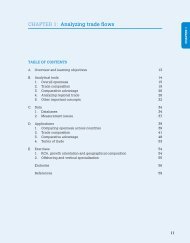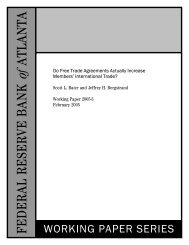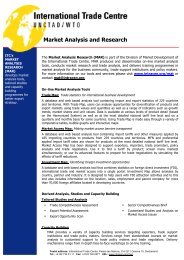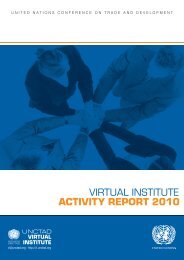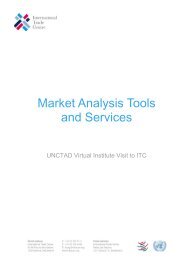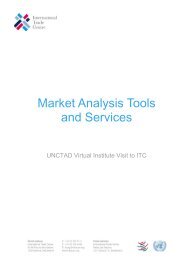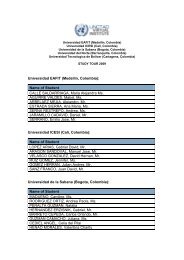Investment Policy Review - Rwanda - UNCTAD Virtual Institute
Investment Policy Review - Rwanda - UNCTAD Virtual Institute
Investment Policy Review - Rwanda - UNCTAD Virtual Institute
Create successful ePaper yourself
Turn your PDF publications into a flip-book with our unique Google optimized e-Paper software.
<strong>Investment</strong> <strong>Policy</strong> <strong>Review</strong> of <strong>Rwanda</strong><br />
specialty coffee, and regulations allow full participation of the private sector in the industry. Given these<br />
conditions and the Government’s objective to move up-market and increase local value-addition, foreign<br />
investment could be promoted in the following areas:<br />
• Washing stations. The Government hopes to have 60 per cent of the crop fully washed locally by<br />
2010, compared with 3 per cent currently. This would require investments of around $10 million<br />
in an additional 80 washing stations. There has been little private investment so far, and unreliable<br />
electricity supply remains a problem for washing stations in remote areas. Although prospects for<br />
FDI are unclear, such projects may appeal to small investors from the region.<br />
• Coffee roasting and production of specialty coffee. The main Government objective for the sector<br />
is to produce specialty roasted coffee for exports. While there is local expertise to increase the<br />
quality of coffee, national investors probably have insufficient knowledge of western markets and<br />
branding to be successful by themselves. RIEPA's targeting effort should thus focus on attracting<br />
one major brand with such expertise.<br />
<strong>Rwanda</strong>n tea, in turn, is grown 65 per cent by smallholders and 35 per cent by estates. As for coffee,<br />
there is little domestic value addition or branding, as output is sold largely by tea factories in bulk,<br />
typically by auction in Mombasa. The sector is organized around nine tea factories, which have associated<br />
estates and also process smallholder production. All of these factories used to be state-owned. One<br />
was partially sold in 2004 to Lab International (United Kingdom), one is close to privatization, and the<br />
remaining seven have been earmarked for privatization.<br />
The privatization of these factories and their estates offers room for further domestic and foreign<br />
private investment in the sector and for further improvement in yields, quality and beneficiation. It is<br />
estimated that current yields could be almost doubled if they were to reach the best international<br />
standards. Aggregate investment to acquire all tea factories could be upwards of $40 million, with additional<br />
investments needed for replanting and factory upgrading.<br />
The privatization of tea factories and estates and private investment in the coffee sector could<br />
generate foreign investment in the near future. The two sectors would also benefit from FDI, particularly<br />
to help them move towards better quality production and higher domestic value addition. In many<br />
respects, however, tea and coffee are mature sectors that do not offer significant prospects for sustained<br />
volume growth or FDI attraction in the medium term. Given the current policy environment in tea and<br />
coffee, the sectors should thus not be at the centre of the FDI strategy.<br />
b. Diversification in agriculture<br />
While the coffee and tea sectors are close to maturity, there are a number of activities in agriculture<br />
that have been little or not explored so far, but that have a potentially strong growth potential and<br />
provide opportunities for rural development, FDI attraction, job creation and exports. The production<br />
and export of flowers, fruits and vegetables may be such an opportunity to diversify and enter markets<br />
for high-value products suitable for airfreight.<br />
101


